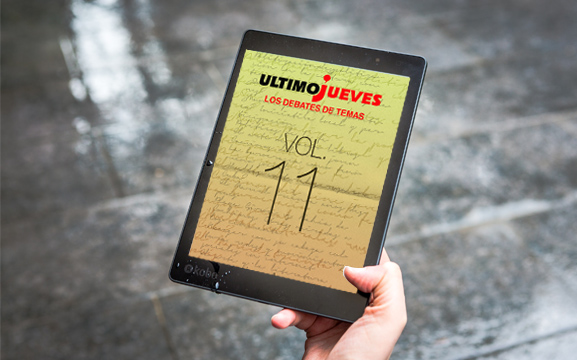These words were spoken by journalist Iroel Sánchez presenting Volume 11 of Ultimo Jueves. Temas debates. For the last few years, the Ultimo Jueves, Debates de Temas collection, has been publishing extracts from key discussions held at the monthly Ultimo Jueves meetings, hosted by the Temas journal so it is no surprise that this year’s Havana International Book Fair, on February 14th, bestowed upon volume 9 of the series the accolade of “Best digital book of the year (2020)”, a distinction that is awarded to books published in 2018-2019.
If you are interested in finding out the values that underpin the Temas debates, which explain not only the award achieved recently but also the ongoing success of the publication over the years, read on for the book presentation, held on February 7th at the Fresa y Chocolate Film and Cultural Center.
“Thanks to Rafael [Hernández, Temas Editor and Ultimo Jueves panel convenor] and to Temas for the invitation to present this book. There is much to be thankful for in this volume that brings together the ten debates that took place in Ultimo Jueves during 2018, particularly its wide-ranging and diverse vision on “temas/topics,” some of which are not widely discussed or considered taboo, others of which seem to be so over-discussed you might think there was nothing new to say about them. In both cases, when they are addressed, they are brought back to the fore for Cuba and its Revolution, breaking down the problems into their constituent parts and exploring their complexity:
In the first group of discussions worth highlighting, I would include:
- Lessons from Chinese and Vietnamese socialisms;
- High-income groups in Socialist societies;
- Corruption and its causes;
- Migration and life choices;
- Urban, property market and housing management;
- Religious fundamentalisms.
In the latter group, I would include:
- The nation and its imaginary;
- Imagination and the sense of the historical moment. New ideas for new moments;
- Decentralization;
- The state of Cuban scientific management.
In each case, fundamental, albeit uncomfortable, questions which we perhaps do not ask ourselves often enough, are posed and we are invited to consider them in depth.
The diversity of the guest panellists, both Cubans and non-Cubans, residents in Cuba as well as visitors, institutional representatives, long-standing specialists, alongside a student, self-employed workers, a devotee of the Santería religious tradition, various academics or a "sniper" —the term used by Rafael Hernández, himself— offers a plurality of approaches that upturn what the Temas director calls “common sense”, causing a disruption that he provokes in his role as “devil's advocate” so that comfortable or superficial views cannot rear their ugly heads, or at least struggle to prevail.
The multi-media approach of this publication is worthy of mention with its occasional audio-visual presentations to the panel of a printed magazine, its visible internet presence, the video links posted on its Facebook page or its website, along with the panellists’ profiles and photos from the debates.
The inclusion of audience participation is a testament to the upholding of the democratic values the journal espouses, which could possibly be further enhanced by hosting the debates in other parts of the country or including panellists from other provinces. The use of surveys among attendees and on social networks, cited in the panel, is yet another contribution to the intention of breaking down the problem at the same time as wiping out all-too-common navel-gazing. This was also demonstrated by Temas’ panel invitation to a group of Puerto Ricans to discuss nation and its imagery, exploring their vision of a stateless nation whose culture has survived in the most difficult of circumstances.
The Temas debates and these edited volumes, which are already on their eleventh edition, should be read by those who pass judgements on freedom of expression in Cuba.
They should also be compulsory reading for anyone who wants to know the ideas that are prevalent in Cuban society, and they are even a valuable tool for the institutions that draft policies relating to the issues addressed. One example of how important it is to hear the vision of the institutions that are sometimes reluctant to accept invitations from Temas, was the panel discussing decentralization which included a high-ranking official from the young province of Mayabeque, and provided testimonies that I had not previously read in the national press.
In the year and a half since the panels included in Volume 11, there are subjects —such as scientific policy or the new Constitution— where changes suggested in these debates have been adopted, but even if that were not the case, the richness of this edition, and its broad range of approaches and analysis, provide a stimulus for critical thinking and for a non-complacent look at social processes.
I do not know if Temas translates these volumes into English, but I think it would be worth doing so. Apart from being important reading across the most important institutions in our country, it is also valuable for those outside Cuba who sometimes condemn us out of ignorance and superficiality.
It is not necessary to agree with everything that is said here; disagreement can cause a broad range of arguments and greater depth of analysis. Ultimo Jueves. Los Debates de Temas is a gift of collective intelligence for Cuba and also for people everywhere who want to explore our country with honesty and without prejudice.
Thanks for doing that.”


Deje un comentario